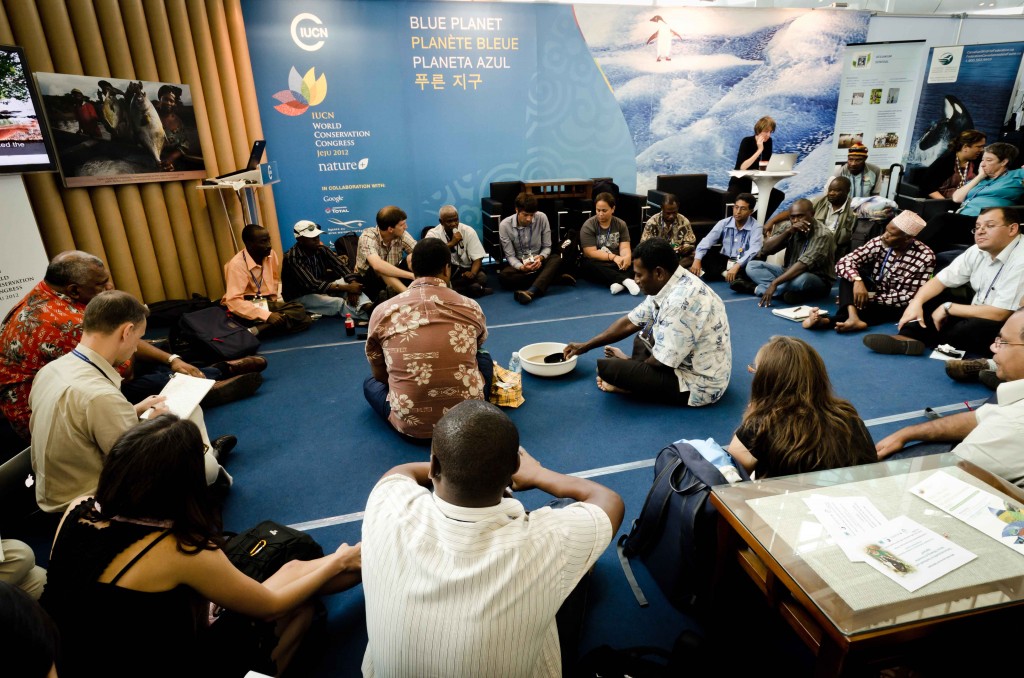by Brian Jones, Conservation Coordinator, Madagascar
We’re seated on the floor in a circle at the Blue Planet Pavilion on the 3rd floor of the International Conference Centre in Jeju-Do, South Korea. Confused passers-by bump into each other and turn their attention from their smart phones to stare sidelong at two large Fijian men dressed in flowered shirts and giant man-skirts kneeling in the centre.
Paulo and Alifereti are engaged in a kava ceremony, merrily doling out big bowls of a strange looking liquid to those of us sitting cross-legged around them. I’ve heard stories of drinking this stuff, which is derived from the kava plant of the western Pacific, leading to black outs and/or euphoric hallucinations — neither of which are on my agenda at 11am on Day 2 of the International Union for the Conservation of Nature’s quadrennial World Conservation Congress (WCC).
Alifereti is holding the dish out to me now… here goes: *clap*, two hands on the dish, muddy looking water down the hatch (tastes like boiled grass clippings), *clap* *clap* *clap*, and it’s over. Round 2 and 3 go down even more smoothly. Maybe it’s psychosomatic, but the repeated bouts of kava do seem to make myself and the other participants more relaxed, more ready to start a conversation, despite the hectic surroundings. A glance around the circle reveals an eclectic bunch, hailing from places such as Grenada, India, Vietnam, Kenya, Madagascar, Papua New Guinea and more, but all sharing the common goal of working to improve community-based marine resource management.
The kava ceremony was just the start of a whirlwind of workshops, knowledge cafes and learning sessions devoted to local approaches to marine management. We’ve affectionately coined this gathering of community representatives from around the world “Kayaks to Korea”.
Well, not really kayaks. More like aeroplanes. A whole handful of them. Thirty hours and three layovers tested even this well-travelled child of the western world, so I can’t imagine what a harrowing experience it must have been for the 16 community leaders who we brought to the event. Many of the recipients of this travel scholarship, provided by the MacArthur Foundation, had never previously left their home countries, let alone boarded an aeroplane.
We’ve come to the picturesque Jeju-Do, a volcanic island located off the south coast of the Korean peninsula, to exchange ideas with the international conservation community. This is the self-described “Nature Olympics”, though with decidedly more donut and coffee consumption by the participants. The WCC is the big shebang, where leading researchers and conservation practitioners come together to discuss the state of the world’s environment (not great, in case you haven’t heard), and what we should be doing about it (quite a bit more). The outcomes of this congress will largely shape conservation policy for the coming years.

Our Korean hosts put on quite a show for the congress participants, and we enjoyed the culture of Jeju-do.
That’s not to suggest that the conference was just a humdrum of lectures on carbon finance and habitat fragmentation. The organisers did an outstanding job of dazzling participants with an array of concerts, banquets and traditional dancing, while also ensuring that sessions focus on interactivity and prescience to the conservation challenges we face together. A handful of IUCN staff even found time to organise a “flash mob”, which you can catch on YouTube here in case you missed it.
Now, my opinion is hopelessly biased, and perhaps the kava’s gone to my head, but I think the local marine management contingent has helped to bring a much needed “boots-on-the-ground conservation” point of view to the congress. They’ve also helped open all of our eyes to the true scale at which local management of the marine environment is taking off. Whereas the expansion of locally managed marine areas (LMMAs) has been fairly well documented in areas like Oceania and east Africa, I personally had no idea of the management efforts going on in places like Thanh Hoa, Vietnam or Minicoy Island, India. Across languages, cultures, continents and generations, much can be learned and shared from amalgamating all of these experiences. The past decade has seen a flood of local management efforts and with it the development of a wealth of knowledge, ideas and best practices.
As the old saying goes, ‘a rising tide raises all boats’. That’s why we’ve been working to develop the “Live With The Sea” website. The site takes its name from the literal translation of Madagascar’s first LMMA, “Velondriake”. Our aim is for the site to become a repository for information on local marine management as well as provide a forum for discussions between marine managers across the globe. While nothing can replace the type of person-to-person interaction between community leaders that we were able to facilitate at the 2012 WCC, we hope the website can prove effective at maintaining an ongoing dialogue and information exchange. However, it may prove difficult to organise an e-kava ceremony…





